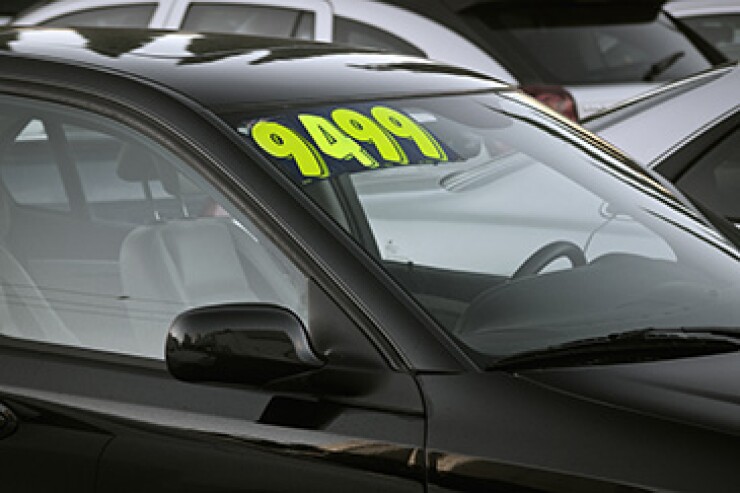
Subprime auto lender Westlake Financial Services is hoping asset-backed investors can stomach a bigger dose of regulatory risk.
Much bigger.
Offering documents for the company’s latest securitization disclose that multiple federal and state regulators have asked the company to provide information about its underwriting and servicing practices.
Their concerns range from what Westlake discloses to investors to how it uses “kill” switches to repossess cars when borrowers fall behind on payments.
In September, Westlake received a subpoena to produce documents from the Securities and Exchange Commission related to its origination, underwriting, servicing and securitization of auto loans, rating agency DBRS states in a presale report published Monday. Among other matters, the subpoena requests all offering materials and communications related to asset-backed securities issued by Westlake since January 1, 2014. Westlake is cooperating with the request, according to the presale repot.
In addition, the Department of Justice initiated an investigation in October to determine whether Westlake violated the Servicemembers Civil Relief Act (SCRA) by allegedly repossessing, without court orders, the motor vehicles of active duty servicemembers and to examine the policies and practices of Westlake with regard to compliance with the SCRA.
“Currently the investigation is preliminary in nature and there has been no determination as to whether the actions of Westlake violated the SCRA,” the presale report states. Westlake provided a response to the DOJ’s request for information on Dec. 9, and has received no further questions or requests.
Then, in November the Federal Trade Commission issued a civil investigative demand to Westlake requesting information and documents relating to use of GPS starter interrupters, geolocation information that is stored or collected from GPS starter interrupters, and what it tells prospective borrowers about these practices.
Westlake is cooperating with the request, according to DBRS.
And in December, Westlake entered into a consent order with Commonwealth of Massachusetts Division of Banks, which had been examining the subprime lender since February 2015. Among other things, the order requires it to cease making loans in the state with interest rates greater than 21% that treat the premium of guaranteed auto protection program (a type of insurance) as a finance charge. It also requires Westlake to cease assessing repossession “close” fees on accounts in the state when defaults are cured prior to repossession.
Westlake will have ongoing reporting requirements to the Commissioner of the Division of Banks to demonstrate compliance with the consent order.
“Westlake does not anticipate any issues complying with the consent order, and this matter will not have a material adverse effect on Westlake’s consolidated financial position, results of operations or liquidity,” DBRS states in the presale report.
Westlake, based in Los Angeles, is a private company owned by auto industry veteran Don Hankey (67%) and Marubeni Corp. (24%). It relies heavily on securitization for financing and has completed 12 transactions since 2010.
If investors can stomach the additional regulatory risk, Westlake is hoping to raise more money. On Monday, it launched an offering of bonds backed by $750 million of retail auto contracts. Both DBRS and Standard & Poor’s expect to assign triple-A ratings to the senior term tranches of notes, which benefit from 42% credit support. That consists of the subordination of other classes of bonds to be issues (34.49%), a reserve account (1.00%) and overcollateralization (6.50%).
BMO Capital Markets Corp. is the underwriter.
Interestingly, S&P’s presale report does not even mention the regulatory scrutiny on Westlake’s underwriting and servicing. However, the rating agency does note that losses in the company’s servicing portfolio have been rising, forcing it to offer additional investor protections on the latest offering in order to secure top credit ratings.
The initial hard credit enhancement increased 200 basis points the senior classes of notes, according to S&P. For example, the initial amount of overcollateralization – a measure of how much the collateral exceeds the value of note issued – increased to 6.5% from 6.0% in a transaction Westlake completed in October. And it’s set to rise to 13%, from 12.75% in the previous deal.
On the other hand, the estimated excess spread, or the difference between the interest received on the collateral and the interest expected to be paid on the notes, has decreased, to 12.80% from 13.97%. (Though this could be an indication that Westlake expects to pay a higher rate of interest on the notes.)
These increases in credit enhancement “offset our higher expected cumulative net loss range for this transaction,” S&P states in the presale report.
“Due to some weaker collateral characteristics in this pool versus past pools, coupled with weaker performance in the company's static pools and managed portfolio, we increased our expected cumulative net loss range for this transaction to 13%-13.50% from 12.75%-13.25%.”
Among other credit characteristics, S&P cited a lower percentage of loans made to higher quality borrowers via its Platinum program, and a lower percentage of loans with a FICO score of 660 (13.53% vs 15.22% in the previous deal).
Also, the percent of longer-term loans, from 61-72 months increased to 26.25% from 26.02%. Longer terms are risky because they amortize more slowly, leaving the borrower “underwater” on the loan for longer. They can also be an indication that the borrower is
On the plus side, the seasoning of the pool increased to 4.64 months from 2.99 months. And the percentage of new vehicles increased to 6.64% from 6.44%.
The weighted average loan-to-value ratio also decreased, to 109.57% from 111.72%.
And the weighted average payment-to-income decreased to 15.71% from 15.98%, while the weighted average debt-to-income decreased to 32.08% from to 32.15%.





